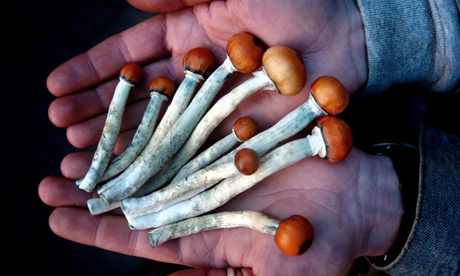Magic mushrooms in the neuropsychoanalytical framework
http://www.guardian.co.uk/science/neurophilosophy/2012/jan/25/1

Psilocybe cubensis on sale in north London. Photograph: Martin Godwin/Guardian
This week, researchers from Imperial College London publish two separate studies of the effects of psilocybin, the psychoactive ingredient of magic mushrooms. The first appeared in Proceedings of the National Academy of Sciences on Monday, and I've written a news story about it for Nature. It's one of a small number of studies using brain scanning to examine the neurological effects of the drug. The second, published in the British Journal of Psychiatry, examines the effects of the drug on the quality of recalled memories.
The past decade has seen a resurgence in psychedelic research, not least because psilocybin and other psychedelic drugs have potential therapeutic value for various psychiatric conditions. Here, I'd like to focus on another aspect of the new studies. Robin Carhart-Harris, lead author on both of the papers, interprets the findings within the framework of neuropsychoanalysis. I briefly describe this emerging movement, and how it might be used to explain the psychological effects of psilocybin.
According to Freud, the self consists of three components – the Id, which is driven by instincts and the pleasure principle, and seeks immediate gratification; the Ego, which is driven by the reality principle, and is concerned with making rational decisions; and the Superego, which is driven by perfection and makes moral judgements. The Ego is torn between the demands of the Id and those of the Superego, and uses various defence mechanisms, such as repression and neuroses, to resolve these conflicts.
Freud also distinguished between two different modes of thought, which he referred to as the primary and secondary processes. The primary process occurs during abnormal states such as dreaming and psychosis, and is characterised by an excess of neuronal or psychical energy as a result of the Id's actions. The secondary process, by contrast, equates to 'normal' consciousness, and involves the efforts of the Ego to minimize the psychical energy generated by the Id.
